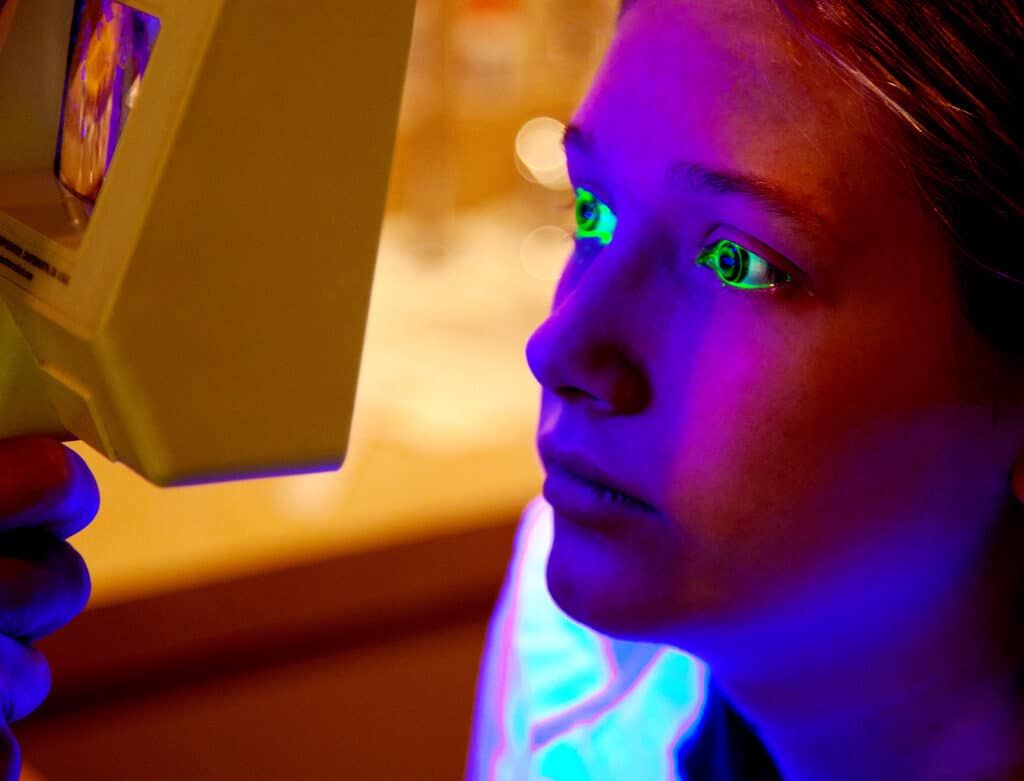Glaucoma is one of the leading causes of blindness worldwide and is characterized by increased intraocular pressure, optic nerve damage, and the potential progressive loss of vision. From the traditional medical perspective, two main types are described: open-angle glaucoma and closed-angle glaucoma.
Glaucoma and Biodecoding: How Internal Conflicts Influence Vision
Both types reflect an alteration in the drainage of aqueous humor (the fluid that nourishes and maintains the shape of the eye), which increases the pressure within this organ. However, there is an alternative line of thought that adds an emotional and symbolic component to this condition: Biodecoding.
This approach, adopted by integrative medicine currents, suggests that certain diseases find their root in internal conflicts or unresolved traumas.
In the case of glaucoma, Biodecoding is based on the hypothesis that the retention of fluids or the “magnifying effect” in the eye could be related to an attempt to “see something more clearly” or the need to “bring closer” someone or something perceived as distant.
Structure and Relevance of Intraocular Pressure
To understand the impact that emotional factors could have on glaucoma, it is first necessary to comprehend how the eye functions.
Aqueous humor, a transparent liquid produced by the ciliary body, circulates in the anterior chamber of the eye and drains through a structure called the trabecular meshwork. When this drainage is obstructed or impeded, the pressure within the eyeball increases and exerts force on the optic nerve. Over time, this pressure can damage the nerve fibers responsible for sending visual information to the brain, leading to gradual vision loss.
Some physical symptoms include blurred vision, the appearance of halos around lights, or eye pain, especially in more aggressive varieties like closed-angle glaucoma. Without appropriate treatment, peripheral vision is compromised, producing the so-called “tunnel vision.” As the damage progresses, it can lead to complete blindness.
The “Magnifying Conflict” and the Fear of What Escapes
Within Biodecoding, a recurring concept about glaucoma is the so-called “Magnifying Conflict.”
It is related to the need to increase perception of something the individual feels is slipping out of sight: it could be a family member they miss, a job opportunity that was overlooked, or a personal goal that seems to drift away over time. The accumulation of intraocular fluid is interpreted as the body’s attempt to “see that important element more closely” that has escaped.
Additionally, glaucoma is also described as a “danger behind the eyes.”
Some emotional currents interpret this as a hidden, almost primitive fear that pushes the person to remain in a constant state of alertness. For example, someone who has lived through a succession of traumatic episodes may feel unable to relax or look back without finding a threat. This tension, on a symbolic level, could retain tears or fluids that, if not released, generate permanent internal pressure.
Resistance to the Passage of Time and Forgiveness
Another highlighted factor in the emotional studies on glaucoma is the relationship with age.
The disease is more common after the age of 60, and in Biodecoding, the possible conflict of “not wanting to see the reality of aging” is mentioned.
Looking to the future becomes blurred, and therefore, a weariness is experienced that joins the resistance to accepting the stage of life that is approaching. The eye, in this interpretation, would retain fluids to “not let go” of what has been lived, reflecting the inability to adapt to the changes that time brings.
On the other hand, various sources agree on the relevance of forgiving old wounds, both towards others and oneself. Unexpressed resentment or repeated frustration feeds internal anxiety that, according to these theories, the body translates into ocular tension.
When a person refuses to accept past experiences, they keep the body in a state of internal contradiction. In this sense, glaucoma could function as a signal that it is necessary to process anger and, above all, release it.
Is There a Real Correlation? The Role of Integrative Medicine
Although Biodecoding is not part of the formal scientific canon, its focus on the emotional component invites reflection on the close connection between body and mind. The field of psychoneuroimmunology supports the idea that chronic stress and depression can influence overall health status, although research is still ongoing to determine the extent to which they can affect ocular conditions like glaucoma.
What is clear is that any disease involving stress or that limits personal autonomy can cause psychoemotional impact. Therefore, integrative medicine—which combines clinical care, mind-body therapies, and deep emotional management work—gains relevance. The goal is to accompany the person in seeking balance in all dimensions: physical, mental, and relational.
Practical Recommendations and Conclusions
People diagnosed with glaucoma should first consult an ophthalmologist to assess optic nerve damage, perform visual field tests, and, above all, define the most appropriate treatment (which may include eye drops, surgery, or laser). In parallel, they can explore supports that address the emotional part:
- Psychological therapy or emotional coaching: to identify limiting beliefs, resentments, or latent fears.
- Relaxation techniques: such as mindfulness or meditation, to reduce stress that could aggravate intraocular pressure.
- Communication and forgiveness: maintaining pending conversations, closing cycles, and freeing oneself from emotional burdens could deactivate anxiety patterns.
Beyond its scientific validity, Biodecoding offers an alternative narrative that connects emotional experiences with physical symptoms. The value of this perspective lies in its invitation to pay attention to integral health and take an active role in emotional management, rather than perceiving the disease as a strictly organic event.
Ultimately, each person will decide how to harmonize traditional medicine with alternative methods that provide a greater understanding of their own history and emotions. Glaucoma, therefore, can be conceived not only as a problem in the drainage of intraocular fluids but also as an opportunity for introspection.
By proposing the possibility of unresolved internal conflicts, this approach underscores the importance of reconciliation with the past, acceptance of the future, and the pursuit of emotional balance that complements medical treatment.
Master Ruada — Biodecoding and Visual Health
Transform your emotional and spiritual life with a personalized tool
Discover the power of Biodecoding combined with Kabbalah. Through your Personal Kabbalistic Tree, designed based on your name and date of birth, you’ll receive a practical guide to work on your emotions and achieve holistic well-being.





